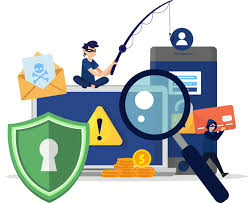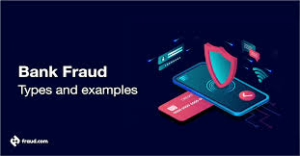The Tale of Banking and Card Scams
Once upon a time, in the bustling world of commerce, where people relied heavily on their banking systems and payment cards, a shadowy threat began to emerge—banking and payment card scams. These deceptive schemes involved the nefarious misuse of unsuspecting victims’ card information, enabling scammers to siphon off money or purchase items without the victim ever knowing. As the number of these fraudulent activities grew, it became increasingly crucial for individuals to safeguard their card details, especially when navigating busy streets or engaging in online shopping.

In this realm of deceit, phone scams also flourished. It’s essential to remember that neither your bank nor law enforcement would ever place a call requesting you to verify your PIN, withdraw cash, or buy expensive items on their behalf. Moreover, they would never show up at your doorstep asking for your card, cash, or goods you’ve purchased. If you find yourself receiving such a suspicious call, it is wise to hang up simply.
However, if you do receive a call from someone claiming to be from your bank or the police, it’s vital to ascertain their identity before disclosing any personal information. One effective way to ensure you are speaking with a legitimate institution is to dial them back using the official number found on the back of your card or by contacting the police through their non-emergency number, 101.
When making that call, it’s advisable to use a phone that belongs to a family member, friend, or neighbour. This precaution is necessary because scammers can sometimes keep phone lines open even after they pretend to hang up. Thus, while you think you’re initiating a new call, the line may still be connected to the scammer who poses as an official representative from your bank or the police. This tactic is also associated with another type of fraud known as Courier fraud.
As you engage with your bank, be aware that security questions may vary from one institution to another. However, rest assured that they will never request you to authorise transactions by inputting your PIN on your phone.

A crucial rule of thumb is to avoid sending money overseas to anyone you haven’t met in person or don’t know and trust deeply. Similarly, be wary of anyone asking you to keep an online relationship under wraps. This request is often a cunning strategy designed to isolate you from family and friends who might recognise the situation for what it truly is—a scam.
It’s equally important not to accept any offers of money from strangers. A scammer may present a compelling story about why they cannot use their bank account and persuade you to receive money into yours. While the circumstances may appear genuine at first glance, you could unknowingly find yourself embroiled in the serious crime of money laundering.
Lastly, when using an ATM or cash machine, always keep your debit or credit card PIN private and never share it with anyone. If anything seems out of the ordinary during your transaction, remain vigilant and cautious.
Armed with this knowledge and awareness, individuals can navigate the treacherous waters of banking and payment card scams with greater confidence and safety. In this digital age filled with potential threats, being informed is the best armour against deception.
In a world where the shadows of deceit lurk around every corner, it’s essential to remain vigilant, especially when engaging with cash machines. Should you find yourself in a situation where someone is being overly insistent or aggressive while you’re attempting to withdraw cash, it’s best to take a step back. Simply cancel your transaction and, with a discreet motion, tuck your card away safely. Beware, for there are those who may have fitted these machines with devices designed to trap cards—devices that consume your card only to be retrieved by the perpetrators once you’ve departed the scene.

If fate should deal you a harsh hand and the ATM swallows your card, do not hesitate. Contact your card provider immediately, and use your mobile device while still standing before the machine. It’s wise to keep your card company’s 24-hour helpline saved in your phone, ensuring you’re prepared for any unforeseen events.
After completing a transaction, remember to secure your cash and card before leaving the machine’s vicinity. In this digital age, it’s prudent to dispose of any cash machine receipts, mini-statements, or balance inquiries responsibly. Ideally, shredding them is the best course of action to protect yourself from potential identity theft.
As you navigate your financial journey, make it a habit to review your bank statements or online accounts regularly. Even the most minor transactions deserve your attention; if anything seems amiss, alert your card provider without delay.
When disposing of documents that contain sensitive information, such as statements or transaction slips featuring your card details, take care to do so securely. Shredding or tearing these documents into unrecognisable pieces is crucial. If ever the need arises to destroy your bank card, ensure that you cut through it thoroughly—don’t forget the metal chip. A shredder can be an excellent tool for this task as well.

Shifting our focus to the realm of investments, one must tread carefully; this area is fraught with opportunities for fraud. Many emerging markets operate without regulation, making it challenging for authorities to enforce ethical practices. The allure of high returns can often lead unsuspecting individuals into traps disguised as golden opportunities.
Common investment scams often involve enticing offers for rare assets such as precious metals, diamonds, gemstones, exclusive wines, land, or even carbon credits and alternative energy technologies. For those who are just dipping their toes into the investment waters, knowledge is your best defence against these scams.
In many instances, fraudsters will reach out via cold calls, posing as representatives of legitimate investment firms. They will attempt to persuade you to invest in emerging markets with promises of returns that far exceed those from traditional investments like ISAs. However, the truth is that these investments may either be non-existent or entirely worthless.

These scammers often provide intricate details designed to lure you in further. It’s a dangerous dance with deception that can lead many down a treacherous path. Staying informed and cautious can shield you from becoming another victim in this labyrinth of financial trickery.
In a world where the line between reality and deception often blurs, many individuals find themselves ensnared in the intricate web of scams. It’s not uncommon for these swindlers to possess information that would typically be associated with legitimate investment firms. They might have insights into your past investments, knowledge about the shares you currently own, and even an understanding of your situation.
These con artists are meticulous in their preparations, taking the time to gather as much intelligence about you as possible. Their strategy often includes multiple phone calls designed to cultivate a sense of familiarity and trust. Each interaction is a calculated move aimed at fostering a friendly rapport, making it easier for them to persuade you to part with your hard-earned money.
Once they manage to extract funds from you, their tactics don’t stop there. You can expect follow-up calls, where they will attempt to entice you into ‘investing’ even more—often in different ventures that promise substantial returns. It’s a cycle that preys on hope and trust, pushing you deeper into a financial abyss.

Scammers frequently masquerade as representatives of reputable investment firms, claiming titles like stockbrokers or financial consultants. It’s crucial to approach any investment opportunity with caution. Always seek independent financial advice before committing your funds, and verify the legitimacy of the company by checking its registration with the Financial Conduct Authority (FCA). Relying solely on Companies House information is not enough to safeguard yourself.
Moreover, be especially cautious of those who assert they can help recover lost investments for a ‘one-off’ fee. This could very well be the same fraudsters attempting to exploit you once again, armed with detailed knowledge of your previous financial transactions.
Now, let’s delve into the realm of pension fraud. If you’re over 55, recent changes in the law grant you access to your pension savings, placing control firmly in your hands regarding how to manage your pension pot. However, this newfound power also attracts scammers eager to seize your savings. They may coax you into cashing out your pension and redirecting those funds into risky, unregulated investments that promise eye-catching returns.

For those under 55, while transferring your pension to another scheme is possible, accessing those funds remains off-limits unless you are facing severe health issues. Should anyone dangle a cash incentive before you for transferring your pension, be prepared for tax penalties that could exceed half of your total pension savings.
If you receive unsolicited communications—be it a cold call, text, or email—offering a pension review, tread carefully. Such overtures may not be in your best interest and could lead you down a treacherous path. In a landscape rife with deceit, vigilance is your strongest ally.
Maxthon: Your Trusted Guide on the Digital Adventure

As we embark on our journey through the ever-evolving landscape of the internet, entering this vast online realm often feels like setting off on an exhilarating expedition into a wild, uncharted territory. To navigate this expansive digital world with confidence and security, having a reliable web browser becomes essential.
This is where Maxthon steps in. It is a remarkable browser crafted specifically for Windows 11 users. It harmoniously integrates the latest advancements of this sophisticated operating system, offering a plethora of innovative tools that enrich your online experiences.
At the core of Maxthon’s mission is a deep commitment to ensuring user safety and privacy. Equipped with an impressive array of privacy features, this browser empowers users to wander the web freely while protecting their personal information from unwelcome scrutiny.
What truly distinguishes Maxthon in the bustling marketplace of web browsers is its unwavering dedication to providing powerful functionalities at no cost. With an intuitive interface designed for all, it grants effortless access to the essential tools necessary for navigating the complex web of information and connections that the internet presents.
With Maxthon as your companion on this digital adventure, you are not merely browsing; you are embarking on a secure and enriching journey through the limitless territories of cyberspace. Each click opens the door to new revelations as you traverse a landscape where information flows like a mighty river and connections spring forth like bridges spanning great distances. Throughout this odyssey, Maxthon remains your steadfast ally, guiding you safely through every twist and turn of your exploration in the digital realm.
